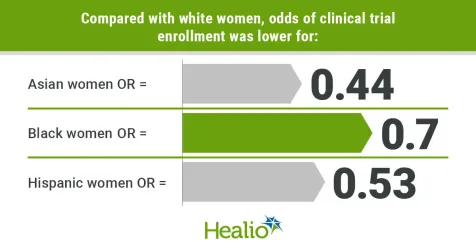By Erin T. Welsh, MA
Key takeaways:
- Clinical trial enrollment was lower for Asian, Black and Hispanic women vs. white women.
- Asian and Hispanic women were underrepresented in endometrial, cervical and ovarian cancer trials.
Asian, Black and Hispanic women with gynecologic cancers had a lower likelihood of being enrolled in clinical trials compared with white women, according to study findings published in JAMA Network Open.
“Recent reports suggest that between 6% and 8% of the U.S. adult population with cancer participates in clinical trials, with lower representation of patients from minoritized racial and ethnic groups,” Wafa Khadraoui, MD, gynecologic oncology fellow in the department of obstetrics and gynecology in the division of gynecologic oncology at Ohio State University Comprehensive Cancer Center at the James Cancer Hospital and Solove Research Institute, and colleagues wrote. “Structural barriers … and clinical factors … have resulted in lower clinical trial enrollment of racial and ethnic minoritized groups, with evidence that this contributes to poorer survival.”

Khadraoui and colleagues conducted a retrospective cohort study using data from 562,592 women with gynecologic cancer (mean age, 62.9 years) from the National Cancer Database and the Surveillance, Epidemiology, and End Results Program. Researchers obtained population-based race- and ethnicity-specific proportions for each cancer site, and all women had an endometrial, ovarian or cervical cancer diagnosis from 2004 to 2019.
The primary outcomes were the odds of clinical trial enrollment and representation in clinical trials compared with the general U.S. population.
Overall, 1,903 women were American Indian/Alaska Native, 18,680 were Asian, 56,421 were Black, 38,145 were Hispanic, 1,453 were Native Hawaiian/Pacific Islander, 442,869 were white and 3,121 were of other races/ethnicities.
Fewer than 1% of women (n = 548) were enrolled in clinical trials. Clinical trial enrollment was lower among Asian (OR = 0.44; 95% CI, 0.25-0.78), Black (OR = 0.7; 95% CI, 0.5-0.99) and Hispanic (OR = 0.53; 95% CI, 0.33-0.83) women compared with white women.
Women who received a gynecologic cancer diagnosis from 2016 to 2019 were approximately 10 times more likely to be enrolled in clinical trials compared with those diagnosed from 2004 to 2006. In addition, women with ovarian (OR = 3.7; 95% CI, 2.69-5.08) or cervical (OR = 4.3; 95% CI, 2.76-6.7) cancers were more likely to be enrolled in clinical trials compared with women with endometrial cancer.
Regarding representation, white women were adequately or overrepresented for all gynecologic cancers compared with the general population. Black women were adequately or overrepresented for endometrial and cervical cancers but underrepresented for ovarian cancer. Asian and Hispanic women were underrepresented for endometrial, cervical and ovarian cancers.
“Further work aimed at understanding the race-specific barriers and facilitators that impact enrollment of gynecologic oncology patients in clinical trials is imperative,” the researchers wrote. “Although we noted lower clinical trial enrollment in multiple minoritized groups, the pathways leading to these outcomes are likely diverse and will require targeted interventions.”
Sources/Disclosures:
Source: Khadraoui W, et al. JAMA Netw Open. 2023;doi:10.1001/jamanetworkopen.2023.46494.
Disclosures: Khadraoui reports no relevant financial disclosures. Please see the study for all other authors’ relevant financial disclosures.
This article was published by: Helio.com

